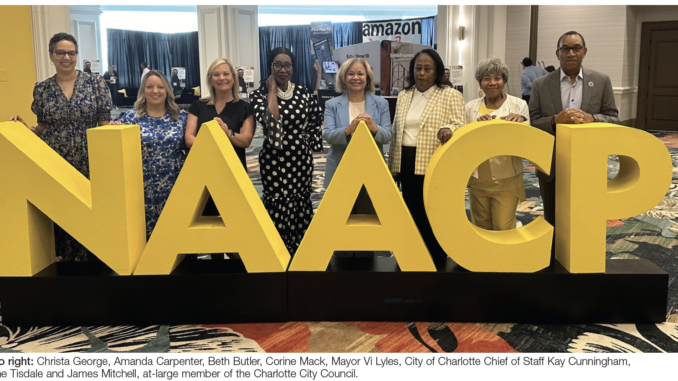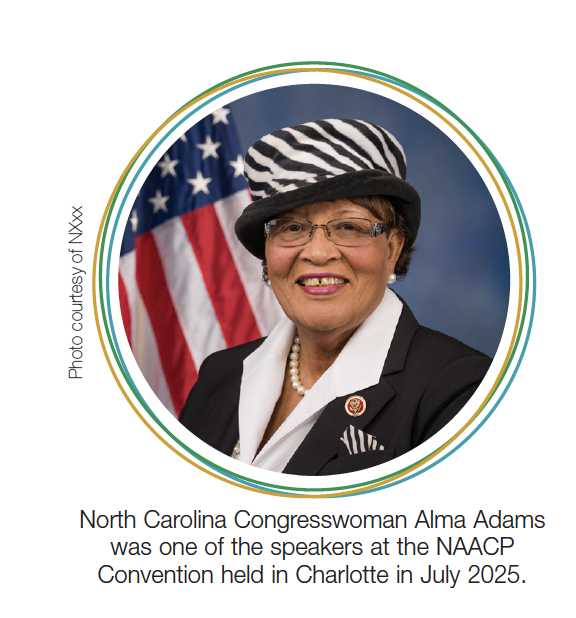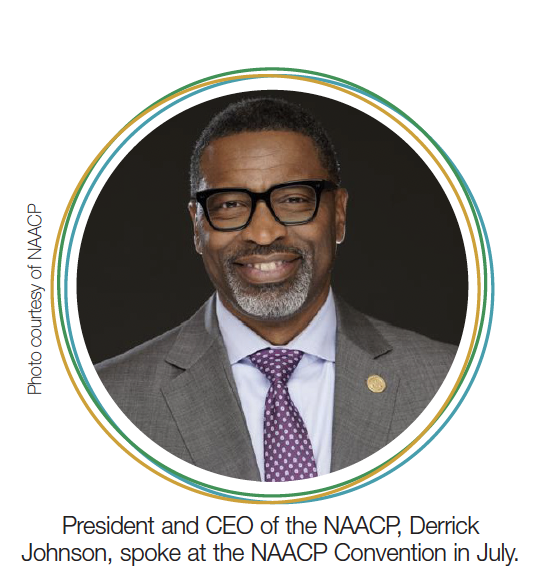
By John Burton Jr.
Uptown Charlotte pulsed with rare energy this summer. Streets filled with delegates in bold-colored suits, local vendors set up bustling pop-up shops, and the sound of gospel music and jazz riffs spilling from “The Hub,” the heart of the NAACP National Convention.
For one week in July 2025, Charlotte wasn’t just hosting a gathering — it was the gathering. The city became the epicenter of history, culture and civil rights dialogue, thanks to the careful planning and vision of the Charlotte Regional Visitors Authority (CRVA).
The NAACP National Convention, one of the country’s most influential gatherings, could have landed in any American city. Instead, it returned to Charlotte for the first time since 1996. Securing the convention was no small feat.

“Charlotte’s story has been shaped by people who paved the way for progress, and that spirit still defines our city today,” said Beth Butler, Director of Destination Services. “Hosting the NAACP National Convention again was truly an honor. It gave us the chance to showcase our city and be part of a gathering with such history and meaning — a responsibility we didn’t take lightly.”
For Christa George, CRVA’s National Sales Manager-Religious & Multicultural, the pitch went beyond logistics. “From the beginning, we knew Charlotte could offer both convenience and a memorable experience,” George said. “Our location made travel easy for members, and our vibrant neighborhoods created a seamless package. Beyond that, the city’s restaurants, cultural attractions and walkable layout allowed the convention to spill beyond meeting rooms and into the heart of Charlotte itself.”
Competition for the NAACP convention was fierce. Yet Charlotte brought something unique to the table: unity.
“What set us apart was the way Charlotte rallied together,” Butler explained. “Our mayor, city officials, business leaders and hospitality partners were all behind the effort. Visitors weren’t just attending an event here; they were experiencing Charlotte at its very best.”
George agreed, adding that Charlotte’s proven record with large, diverse gatherings helped seal the deal. “The city itself has grown tremendously since the last time NAACP was here. We were able to show them a destination that not only had the infrastructure they needed but also a proven record of welcoming groups of all sizes with care and attention.”
If the Convention Center served as the official stage, The Hub was its beating heart. A vibrant gathering place open to delegates and the general public, it buzzed daily with panel discussions, cultural showcases, and local pop-up shops.
“One of my favorite parts was watching The Hub take shape,” Butler said. “Seeing small local businesses set up and connect with attendees-and with each other-was really special. It felt like the city itself was woven into the fabric of the convention.”
From locally roasted coffee to hand-stitched African garments, The Hub represented Charlotte’s diversity. It became a place where national leaders brushed shoulders with local entrepreneurs, creating a rare sense of community.
The magnitude of the convention required partnerships across all levels. The mayor’s office, Mecklenburg County leaders, the corporate community and the Charlotte branch of the NAACP, led by Rev. Corine Mack-all played pivotal roles through a Blue-Ribbon Committee.
“We’re fortunate in Charlotte to have strong relationships with our city and county leaders,” said Butler. “Their collaboration helped us create a truly welcoming atmosphere for thousands of visitors. When the right people come together with a shared purpose, it elevates the entire experience. That’s exactly what happened here.”
One of the most powerful themes of the 2025 convention was bridging divides, and nowhere was this more evident than in youth programming.
“For me, it was the youth programming,” Butler shared. “More than 200 students took part in a Community Service Day where they built 25 Little Free Libraries for schools and neighborhoods across Charlotte. It was about more than building libraries. It was also about building connections across generations and showing these students how powerful it feels to give back.”
The sight of teenagers hammering nails and painting bright blue library boxes, while elders looked on proudly, captured the convention’s spirit: honoring the past, empowering the present and planting seeds for the future.
Even with high-profile guests-from civil rights leaders to entertainers, George found herself most inspired by the way local voices were uplifted. “It was meaningful to see Charlotte’s own leaders, advocates, and entertainers showcased on such a big stage. It reminded me that our community has incredible talent and stories to share right alongside national leaders.”
For Butler, the memory she’ll carry forward isn’t a keynote speech but a moment at the Market at 7th Street. “One of those Little Free Libraries we built was placed there. Seeing families using it reminded me that the convention’s impact will last long after the lights dim.”
The convention’s economic boost was clear-hotels were full, restaurants bustled, and small businesses flourished-but its deeper legacy is reputation.
“Hosting the NAACP Convention was an incredible opportunity,” said George. “Events like this aren’t just about filling hotel rooms. They create jobs, boost small businesses, and leave a lasting impact. NAACP was intentional about connecting with the community while they were here, from supporting local businesses in The Hub to opening experiences to the public. That kind of engagement showed Charlotte at its best.”
As the last delegates departed and Uptown’s streets grew quieter, one thing was clear: Charlotte had not just hosted the NAACP National Convention — it had risen to the occasion, leaving an indelible mark on all who attended.




